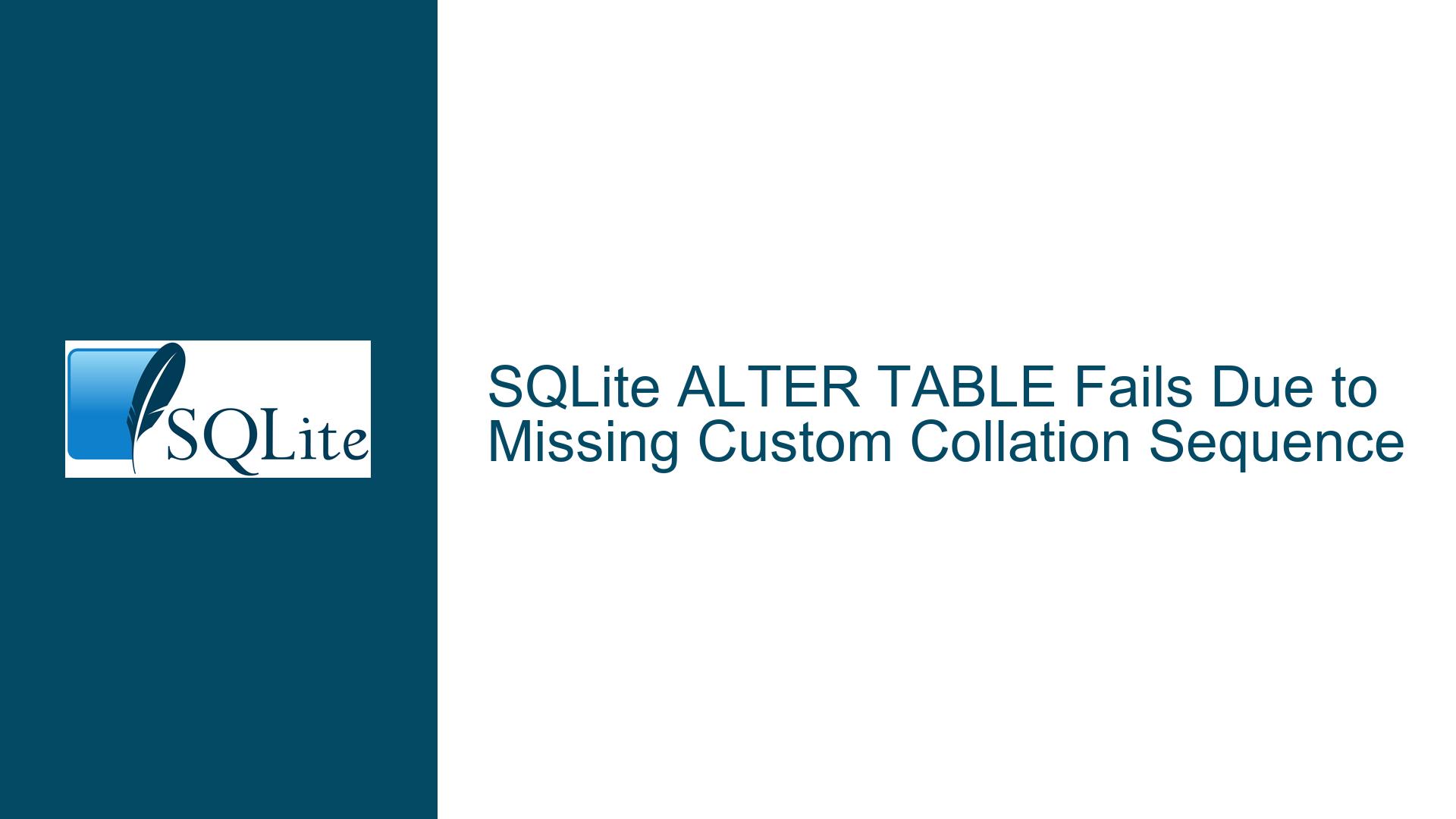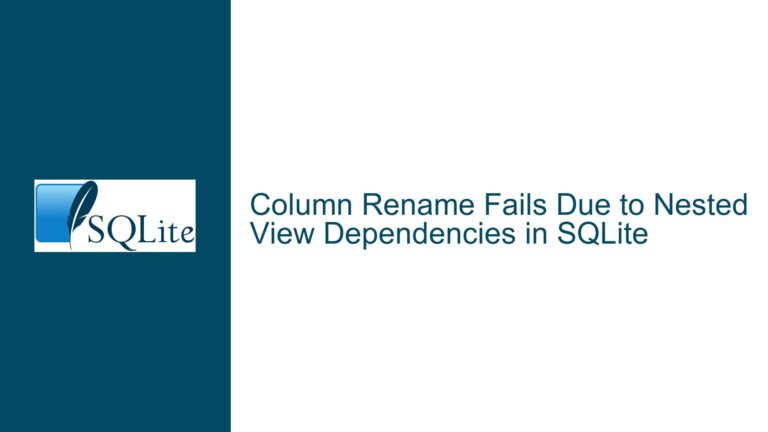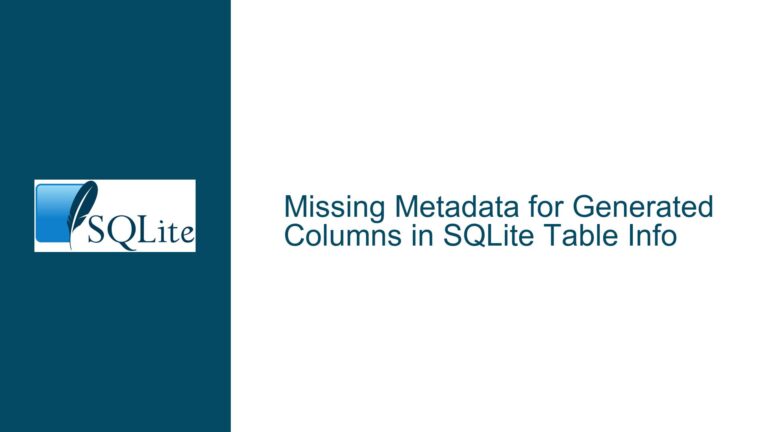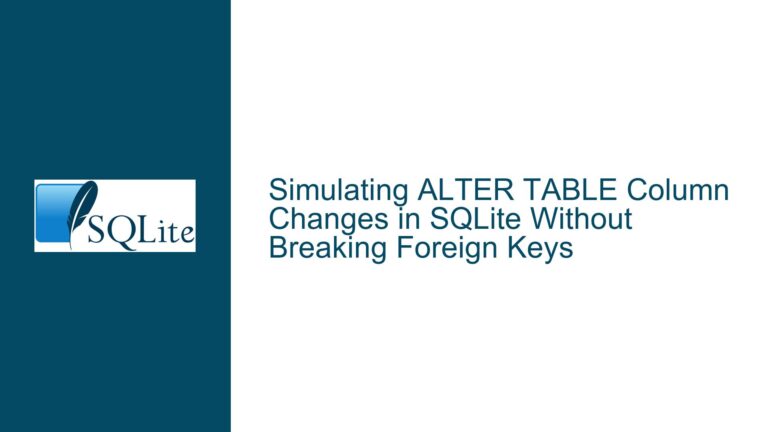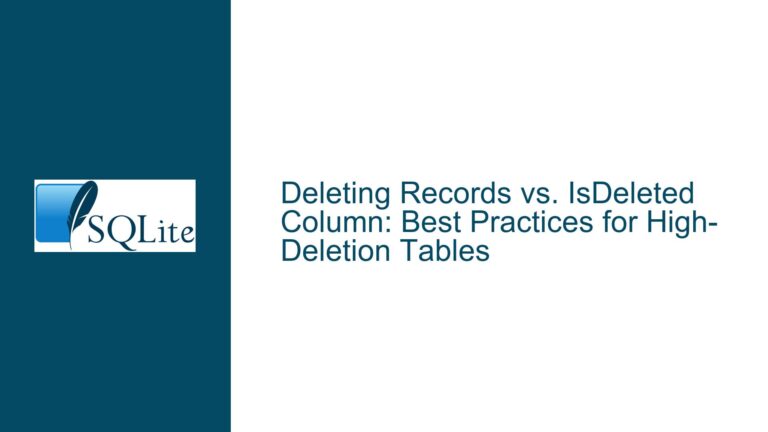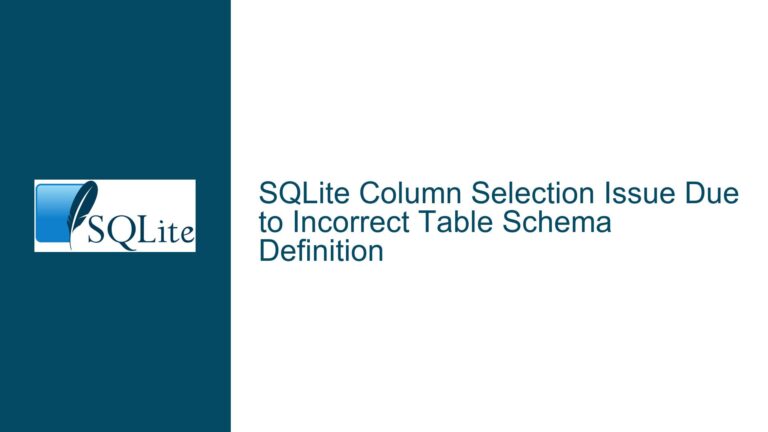SQLite ALTER TABLE Fails Due to Missing Custom Collation Sequence
ALTER TABLE RENAME Operations Fail with Missing Custom Collation Sequence
When performing ALTER TABLE operations in SQLite, specifically RENAME TO and RENAME COLUMN, the process can fail if the database schema references a custom collation sequence that is not currently loaded. This issue arises because SQLite, during certain ALTER TABLE operations, scans the entire schema to ensure consistency and integrity. If a table or column references a custom collation sequence that is not available, the operation will fail with an error indicating the missing collation sequence.
In the provided scenario, the ALTER TABLE gigo RENAME TO ggiiggoo operation failed because the schema includes a table OED_index_collated that references a custom collation sequence named compare64. This collation sequence was not loaded at the time of the ALTER TABLE operation, causing SQLite to throw an error: Error: error in table OED_index_collated: no such collation sequence: compare64.
This behavior is expected because SQLite must ensure that all referenced objects, including custom collation sequences, are available during schema-altering operations. The database engine performs a comprehensive check to maintain data integrity, and any missing dependencies will cause the operation to fail.
Custom Collation Sequence Dependency in Schema Validation
The root cause of the issue lies in the dependency of the schema on a custom collation sequence that is not loaded at the time of the ALTER TABLE operation. SQLite’s schema validation process during ALTER TABLE operations involves scanning all tables and their associated objects, including indexes, triggers, and views, to ensure that all referenced entities are valid and available.
In this case, the table OED_index_collated has a column position that uses the custom collation sequence compare64. When the ALTER TABLE operation is executed, SQLite validates the schema and encounters the reference to compare64. Since the collation sequence is not loaded, SQLite cannot proceed with the operation, resulting in an error.
This issue is particularly relevant in scenarios where custom collation sequences are used sparingly or are loaded dynamically based on application requirements. If the collation sequence is not loaded during the schema validation phase, the ALTER TABLE operation will fail, even if the target table being altered does not directly reference the custom collation sequence.
Ensuring Custom Collation Sequence Availability During Schema Changes
To resolve this issue, it is essential to ensure that all custom collation sequences referenced in the schema are loaded before performing any ALTER TABLE operations. This can be achieved through the following steps:
Identify Custom Collation Sequences in the Schema: Review the schema to identify all tables, columns, and indexes that reference custom collation sequences. In the provided example, the table
OED_index_collatedreferences thecompare64collation sequence.Load Custom Collation Sequences: Before executing any
ALTER TABLEoperations, ensure that the required custom collation sequences are loaded. This can be done by registering the collation sequence using the appropriate API calls in the programming language or environment being used. For example, in Tcl, thesqlite3_create_collationfunction can be used to register the custom collation sequence.Verify Collation Sequence Availability: After loading the custom collation sequence, verify its availability by querying the schema or performing a test operation that references the collation sequence. This ensures that the collation sequence is correctly registered and available for use.
Execute ALTER TABLE Operations: Once the custom collation sequence is loaded and verified, proceed with the
ALTER TABLEoperations. The schema validation process will now succeed, as all referenced collation sequences are available.Handle Dynamic Collation Sequence Loading: In scenarios where custom collation sequences are loaded dynamically, ensure that the application logic handles the loading and unloading of collation sequences appropriately. This may involve checking the schema for references to custom collation sequences and loading them as needed before performing schema-altering operations.
By following these steps, you can prevent issues related to missing custom collation sequences during ALTER TABLE operations and ensure the smooth execution of schema changes in SQLite.
Detailed Analysis of Schema Validation During ALTER TABLE Operations
To further understand the issue, it is important to delve into the mechanics of schema validation during ALTER TABLE operations in SQLite. When an ALTER TABLE command is executed, SQLite performs a series of checks to ensure the integrity and consistency of the database schema. These checks include:
- Table and Column Existence: SQLite verifies that the table and columns involved in the operation exist and are valid.
- Index and Trigger Validation: SQLite checks that any indexes or triggers associated with the table are valid and do not reference invalid objects.
- Collation Sequence Availability: SQLite ensures that any collation sequences referenced by the table or its associated objects are available.
In the provided scenario, the schema validation process encountered a reference to the compare64 collation sequence in the OED_index_collated table. Since the collation sequence was not loaded, SQLite could not validate the schema, resulting in an error.
This behavior highlights the importance of ensuring that all dependencies, including custom collation sequences, are available during schema-altering operations. Failure to do so can lead to errors and prevent the successful execution of ALTER TABLE commands.
Best Practices for Managing Custom Collation Sequences in SQLite
To avoid issues related to custom collation sequences during schema changes, consider the following best practices:
Centralize Collation Sequence Registration: Centralize the registration of custom collation sequences in your application code. This ensures that all required collation sequences are loaded before any database operations are performed.
Schema Documentation: Document the schema thoroughly, including any custom collation sequences and their usage. This helps in identifying and managing dependencies during schema changes.
Automated Dependency Management: Implement automated dependency management in your application to handle the loading and unloading of custom collation sequences. This can be achieved through hooks or event handlers that trigger before and after schema-altering operations.
Testing and Validation: Test schema changes in a controlled environment before applying them to production databases. This helps in identifying and resolving issues related to custom collation sequences and other dependencies.
Error Handling and Recovery: Implement robust error handling and recovery mechanisms to handle cases where custom collation sequences are missing or unavailable. This includes providing meaningful error messages and fallback options.
By adhering to these best practices, you can ensure the smooth execution of schema changes in SQLite and avoid issues related to missing custom collation sequences.
Conclusion
The issue of ALTER TABLE operations failing due to missing custom collation sequences is a nuanced aspect of SQLite schema management. By understanding the underlying causes and implementing best practices for managing custom collation sequences, you can prevent such issues and ensure the integrity and consistency of your database schema. Always ensure that all dependencies, including custom collation sequences, are available before performing schema-altering operations, and thoroughly test changes in a controlled environment to avoid unexpected errors.
